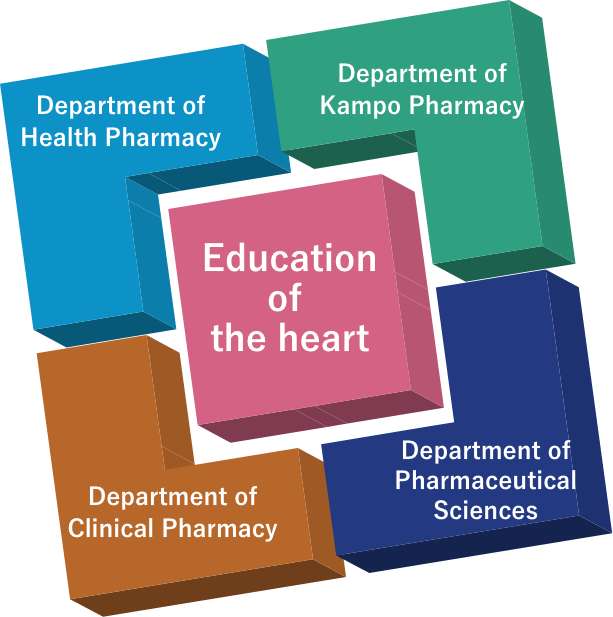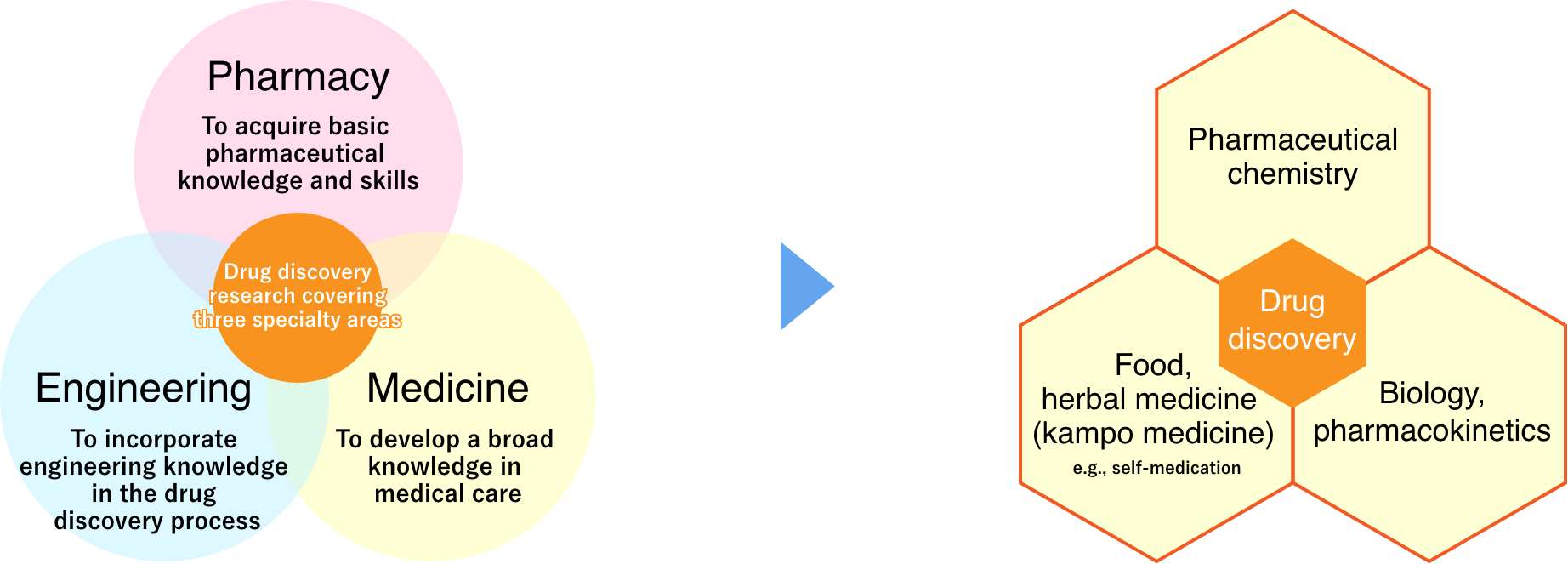
Profile
Yokohama University of Pharmacy was established in 2005 under the School Education Act with the primary goal of nurturing pharmacists with practical clinical skills through its six-year consecutive education.
Through its research and education, the university helps students develop an understanding and knowledge of medical and paramedical services at large, as well as a wide range of factors other than drugs that can affect human health, thereby developing globally-minded pharmacists with 21st century skills and the eagerness to enter the medical field abroad. In doing so, the university aims to connect team medical care with experienced-based Oriental medical practices, including, among other things, kampo medicine, which have long been sidelined in the conventional four-year pharmaceutical education in Japan.
In response to the needs of society and students, the university opened a four-year course, the Department of Pharmaceutical Sciences, in 2015 to develop human resources with pharmaceutical knowledge coupled with the ability to play an active role in various sectors of society and cope with a wide range of issues.
Characteristics of education

To develop warm-hearted medical professionals, we guide students to develop an understanding of the fundamentals of drugs, roles of pharmacy, and the responsibilities and commitments required of medical professionals.
-
- Acquisition of basic knowledge necessary to study pharmacy
- Students acquire fundamental pharmaceutical knowledge by studying introductory and basic subjects in pharmacy.
-
- Educational program to learn cutting-edge medical care
- We offer a range of innovative educational programs that allow students to learn cutting-edge medical technologies and deepen their understanding of "tailor-made medical care" and "preventive medicine."
-
- Development of practical skills required of pharmaceutical professionals
- Practical training at hospitals and pharmacies helps students develop the practical skills required to work as a pharmaceutical professional in a team.
Six-year courses

Today, the focus of medical care is shifting to personalized drug therapy and prevention of disease development. In addition, greater importance is being given to the appropriate use of pharmaceutical products and prevention of medical malpractice due to the growing concern over medical accidents. Pharmacists play a major role in all these issues. Yokohama University of Pharmacy aims to nurture pharmacists with the ability to meet modern demands.
In 2002, the Pharmaceutical Society of Japan published the "Model Core Curriculum for Pharmacy Education" to enhance pharmacy education to prepare for the introduction of six-year pharmacy education. In line with this Model Core Curriculum as well as the recommendations of the Council of Research and Study Collaborators on Improving and Enhancing Pharmacy Education, Yokohama University of Pharmacy has developed a six-year curriculum covering a broad range of liberal arts and clinical pharmacy subjects and long-term practical training to develop pharmacists with the ability to contribute to "tailor-made medical care" and "preventive medicine."
"Education of the heart" based on the founding motto
To develop warm-hearted medical professionals, we guide students to develop an understanding of the fundamentals of drugs, roles of pharmacy, and the responsibilities and commitments required of medical professionals.
Acquisition of basic knowledge necessary to study pharmacy
Students acquire fundamental pharmaceutical knowledge by studying introductory and basic subjects in pharmacy.
Educational program to learn cutting-edge medical care
We offer a broad range of innovative educational programs that allow students to learn cutting-edge medical technologies and deepen their understanding of "tailor-made medical care" and "preventive medicine."
Development of practical skills as pharmaceutical professionals
Practical training at hospitals and pharmacies helps students develop the practical skills required to work as a pharmaceutical professional in a team.
Four-year course
The Department of Pharmaceutical Sciences, a four-year course, offers education on cutting-edge medical technologies in addition to the conventional pharmacy education to help students acquire the skills needed to work as a technical expert (Meister) at pharmaceutical, chemical, cosmetic, food or other bio-tech companies or help them prepare for advanced studies at graduate schools in bioscience-related fields, such as pharmacy, science, engineering, basic medical science and agriculture.
With the curriculum consisting of specialized subjects in pharmacy, the Department of Pharmaceutical Sciences aims to develop specialists in drug discovery, development and production, as well as educators and researchers in the health food, cosmetic, environmental and sanitary and other pharmacy-related fields.

Faculty qualifications
Yokohama University of Pharmacy seeks faculty members with practical skills to teach pharmaceutical topics and the commitment to developing warm-hearted medical professionals by instilling in students "sokuin no kokoro," or the ability to understand the suffering of others, in line with the educational principle of the university, "Reach your fullest potential in life through personal development."
The faculty members of Yokohama University of Pharmacy are expected to make consistent efforts in research and self-discipline and remain committed to performing their duties with a deep understanding of this lofty mission of the university.
Desired qualities of faculty staff
- Distinguished ability as an educator and researcher in a specialized pharmaceutical field
- Advanced specialized skills in a wide range of pharmaceutical fields, from basic pharmacy to applied, medical and clinical pharmacy and practical clinical skills
- Good understanding of pharmacy education, belief in its significance, and a strong determination and passion for education
- Ability to educate students on "tailor-made medical care" based on "sokuin no kokoro"
Faculty organization
- Yokohama University of Pharmacy organizes its faculty in a manner that flexibly and openly adapts to changing research and educational needs resulting from the recent rapid progress of pharmacy.
- The university's educational and research organization combines the advantages of the subject system, which allows flexible allocation of specialized subjects and faculty in charge, and the chair system, which effectively provides research guidance.